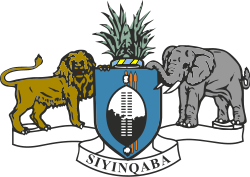Constitution
The Senate must not exceed 31 members, and currently numbers 30. [3] The King of Eswatini appoints 20, while the remaining ten are elected by the House of Assembly. [5] Of these, at least eight of the 20 and at least five of the ten must be women. [5] However, according to the Inter-Parliamentary Union database, in 2008, there were 12 women senators instead of the minimum stipulated 13, [6] and in 2013, there were only ten. [7]
Elections
Election is by secret ballot in a first-past-the-post system of voting. [8] All senators serve five-year terms. Each senator must be at least 18 years old, a citizen, a registered voter, and have "paid all taxes or made arrangements satisfactory to the Commissioner of Taxes". [8] Disqualifications are: being insolvent under any law without having been "rehabilitated", being of unsound mind, sentenced to death or more than six months in prison for a crime in Eswatini, a member of the country's armed forces or holding or acting in a public office without being granted a leave of absence to serve in the Senate, unqualified to be a voter, otherwise disqualified by law, found incompetent to hold public office, connected to a firm with a government contract and having not made the proper disclosures regarding the contract, or holding or acting in any office connected with the conduct of any election or the compilation or revision of any electoral register. [8]
In July 2005, a new constitution was approved by the Parliament and signed by King Mswati III. The first election under the new constitution took place in September 2008. [5] The most recent election was held in September 2013. [5] Gelane Zwane ran unopposed and was elected President of the Senate for the third consecutive time. [9] Ngomuyayona Gamedze was chosen as Deputy President, also for the third consecutive time. [9] Six of the King's selections were members of his family. [10]
Later in 2013, the Senate banned Members of Parliament from divorcing while in office to "avoid embarrassing the king." [11]
This page is based on this
Wikipedia article Text is available under the
CC BY-SA 4.0 license; additional terms may apply.
Images, videos and audio are available under their respective licenses.


